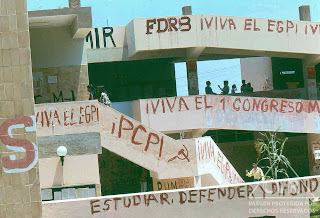Hello again guys. It's been good to remove the pressure to post regularly, but I can't quite leave the blog behind ;-) Now it's the weekend, and here's an update of the memory news out of Argentina this week.
It's the usual good news/

bad news combo from the human rights trials. Following the triumph of Bignone's conviction, there was further cause for optimism when the
Supreme Court overturned the pardon of dictatorship-era economy minister José Martínez de Hoz. Once known as the "wizard of Hoz" for the magic he practised on the Argentine economy (for a brief period), Martínez de Hoz was one of the most powerful civilians in the military regime. Pagina/12 ran with the headline "
Up to his ears in it" - can you guess why?
At the same time, however,
IPS is repeating complaints that the justice process is plagued by delays and setbacks.
"The judicial branch is mainly responsible for the delays. There are cases of complicity with the dictatorship, because certain sectors entrenched in federal power want to guarantee impunity," lawyer Andrea Pochak, deputy director of the Centre for Legal and Social Studies (CELS), told IPS. [...]
"Nowadays, Mendoza is our main concern. Because of complicity, some judges delay the prosecutions and leave the trials in limbo, waiting for the accused to die (of old age) before justice can be done," she complained.
The Madres de Plaza de Mayo have been as busy as ever,
commemorating their 33rd anniversary.
President Kirchner was the main speaker at the event at the cultural centre in the former ESMA site. They also
staged a symbolic 'people's trial' on Thursday against journalists whom they claim were complicit with the military regime. According to the leader of the Madres, Hebe de Bonafini, who was acting as 'judge',
"This trial has to do with denouncing the sellouts, the accomplices, those who never said anything when we were imprisoned," she told crowd of several hundred people. "What we don't want is for the same journalists who lied then to keep doing it now."
The event had an extra political charge because of the government's ongoing conflict with the media group Clarin.
This Reuters article makes the case that the issue surrounding the biological parentage of Felipe and Marcela Noble Herrera is politically motivated. I'm quite sure that the Kirchner adminstration will be celebrating if Ernestina Herrera de Noble is officially outed as an accomplice of the dictatorship, but such a charge also strikes me as deeply unfair to the main group behind the struggle, the Abuelas de Plazas de Mayo. No, the grandmothers aren't saints, and they have their political opinions, but they been fighting to discover the disappeared children for over thirty years now. They simply won't back down because this family is rich, powerful, and prepared to fight them through the courts.
"For the Grandmothers this is not a fight between the government and a media group... It's not about politics. It's about human rights," Estela de Carlotto, head of the Grandmothers, told state-owned Channel 7 television last week.
Finally, there's an article from the National Security Archive on how the
Madres provide inspiration for relatives of the disappeared all over the continent - in this case, Mexico.
















